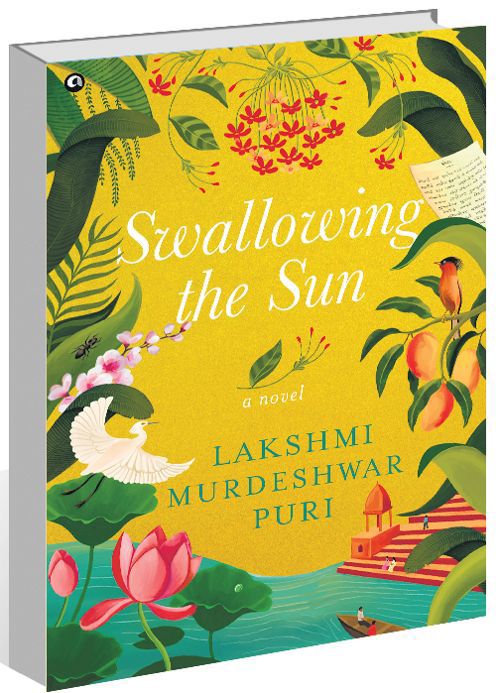Swallowing the Sun: A Novel by Lakshmi Murdeshwar Puri. Aleph. Pages 424. Rs 899
Book Title: Swallowing the Sun: A Novel
Author: Lakshmi Murdeshwar Puri
Rajiv Dogra
The first known leap, though mythical, at ‘swallowing the sun’ was made by baby Hanuman. He had mistaken the sun for a fruit, but his audacious flight was cut short by the God Indra. Lakshmi Puri’s allegorical leap at ‘Swallowing the Sun’ is a quest of a different kind, one that remained uninterrupted by the muse in its fluent flow.
The canvas she sketches on is large, with multiple players. Yet, there is no distraction in its gripping narrative. Its plot transports us back to the times between the early and the mid-20th century.
It was an age when feudals were still the lords of all that they survey, and the poor were in the depths of misery. This was also the time of shuttered dreams; of a nation in chains, of vast masses in slotted misery from birth and of the girl child whose dreams died young. This in effect was a time of stasis; where no movement and contentment confusedly merged into each other.
The British rule was all-pervasive and so was the fear of its retribution. In a long- delayed response by the Indian people (after 1857, of course), the first faltering attempts at revolt began to incubate. It fired at least some of the young with rage, often singeing them with the consequences of being found out by the system. Against this background, Lakshmi Puri’s novel is about the eeriness of transformative change. ‘Swallowing the Sun’ transports us back to this era when despite the odds, a few dared to break new ground.
The first among these was Baba, a simple peasant with lofty ideas and loftier courage, who dreams big for his three daughters. The eldest Surekha is one of the most eligible among young girls in Ratnagiri. Naturally then, there is no shortage of suitors and it is just a matter of time before she is married to Malak Vilas Rao, the finance minister in Vaishali Maharaja’s court. When, after their marriage, Baba and his other two daughters are about to depart from the opulence of Malak’s palace, Surekha implores, “Baba, you all will go back and I will have to stay and sort out the illusion from reality.”
Remarks like this illuminate the narrative and shake you up with their unexpectedness. And, as later events reveal, Surekha largely sails through life successfully, with dignity and aplomb.
Malak comes across as a self-assured and dignified aristocrat who stands by her and her family like a rock. But in this cast of strong characters, it is Baba who impresses the most with his courage while facing dacoits, with his pioneering spirit in transforming a barren land and above all, by defying the conservative society and sending off his two younger daughters, Kamala and Malati, to Ahilya Ashram, a boarding school for orphans.
This is followed by another bold step when Baba takes them to Bombay for admission into the male-dominated Elphinstone College. Even more daringly, he puts them up as paying guests with a couple. Bombay becomes their karmabhoomi, the cause of their agony and ecstasy in life. It is here that the impetuous Malati flowers into adulthood. Lakshmi is at her descriptive best. Again and again, details come back reframed or reanimated, as the reader becomes one with Malati, admiring her for her gumption, decisiveness and her conviction that she had chosen the man she wanted to live with.
Kamala and Malati had already broken society’s glass ceilings by going to a boarding school and then to college in big Bombay. But there is more. Malati’s teaching spell at Banaras Hindu University, her brush with the revolutionaries and the descriptions of the hauntingly charming Banaras pockmarked with filth remind the reader of an ancient but flawed city.
The many splendoured book is epic in proportion, spread over 412 pages. Yet, there is not an extra word, nor an unnecessary twist to the narrative. In fact, the characters stay with you long after you have read about them.
The book brings forth subtly the trials of a nation in bondage, and reveals the human side of the families who otherwise seem to be blessed with plenty. Above all, it is a story about Malati, who dared to dream. That Lakshmi Puri should have used a rancourless pen to write this magnificent book is only to be expected. And that she should have written about women breaking glass ceilings was also natural. After all, she herself has broken many, including when she went on to lead ‘UN Women’.














